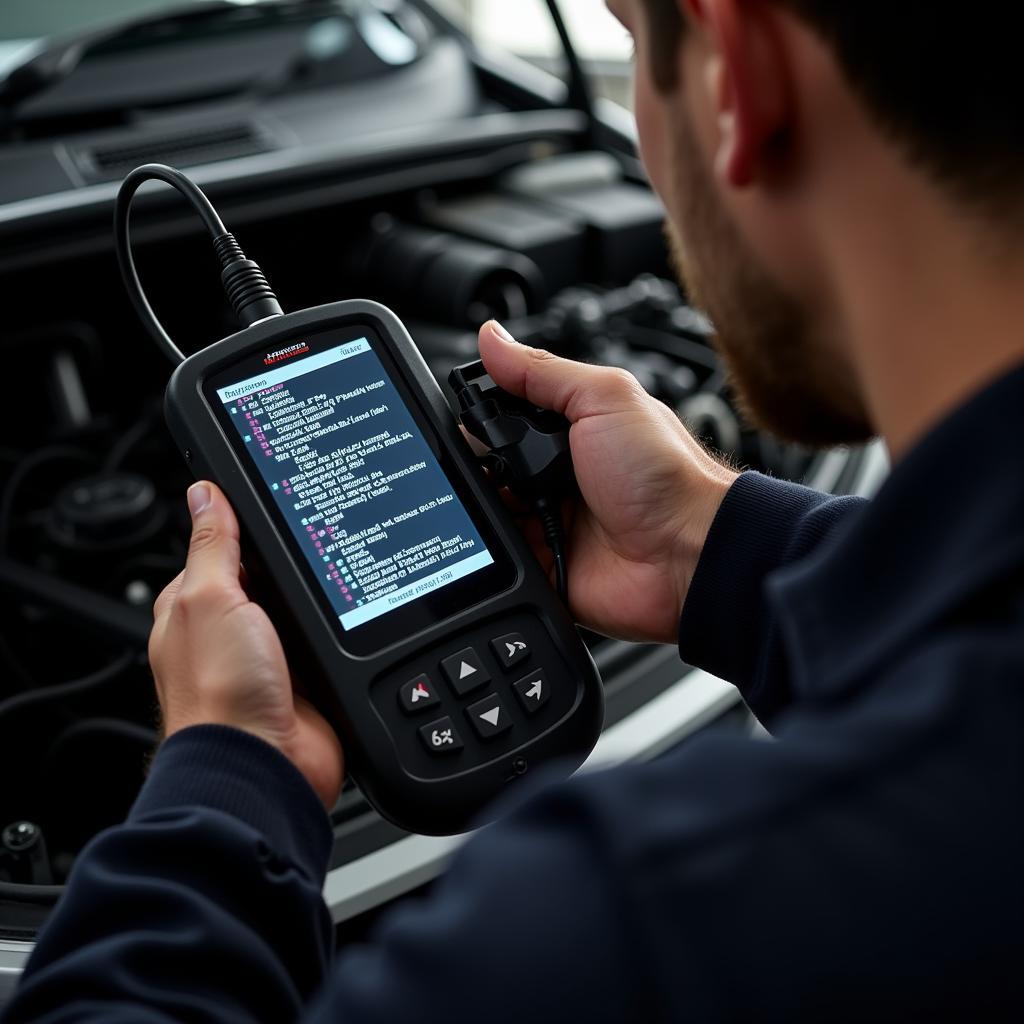Understanding the Role of a Scan Tool
A scan tool is an essential piece of equipment for any modern automotive workshop. These diagnostic powerhouses unlock a wealth of information about a vehicle’s electronic control units (ECUs). They allow technicians to read and clear diagnostic trouble codes (DTCs), view live data streams from various sensors, and even perform actuator tests. Essentially, they provide a window into the inner workings of a vehicle’s computer systems, allowing for precise diagnosis of electrical and electronic faults. Imagine trying to find a needle in a haystack – a scan tool acts like a powerful magnet, instantly pinpointing the issue.
 Scan tool diagnosing a car's ECU
Scan tool diagnosing a car's ECU
The Unseen Threat: Mold in Automotive Systems
While often overlooked, mold can wreak havoc on a vehicle’s electrical system. Moisture intrusion, a common cause of mold growth, can lead to corrosion of electrical connectors, wiring harnesses, and even ECUs. This corrosion can cause intermittent electrical problems, short circuits, and complete component failure. Mold can also directly impact sensors, leading to inaccurate readings and triggering spurious DTCs. This can send technicians on a wild goose chase, replacing perfectly good parts while the real culprit remains hidden.
Identifying and Addressing Mold-Related Issues
Diagnosing mold-related electrical problems requires a multi-faceted approach. First, a thorough visual inspection is crucial. Check for signs of moisture intrusion, such as water stains, discoloration, or a musty odor. Then, utilize your scan tool to pinpoint any unusual sensor readings or DTCs that may point to a mold-related problem. “Don’t just treat the symptoms, find the root cause,” advises John Smith, Senior Automotive Electrical Engineer at Apex Automotive Solutions.
Scan Tool & Mold: A Critical Connection
The connection between a scan tool & mold may not be immediately obvious, but it’s essential for effective diagnostics. A scan tool helps identify erratic sensor readings and DTCs that can be indicative of mold-related problems. For example, if a humidity sensor consistently reports high humidity inside the vehicle, it could point to a hidden moisture issue and potential mold growth. This allows technicians to investigate further and address the underlying cause, rather than just treating the symptoms.
Leveraging Advanced Scan Tool Features
Modern scan tools offer advanced features that can aid in diagnosing mold-related issues. Live data streaming allows technicians to monitor sensor readings in real-time, helping identify intermittent problems that may be caused by corrosion or mold growth. Some scan tools even provide access to manufacturer-specific diagnostic procedures and troubleshooting guides, further assisting in pinpointing the root cause of the problem. “Utilizing all the features of your scan tool can significantly reduce diagnostic time and improve repair accuracy,” adds Maria Garcia, Lead Technician at AutoTech Solutions.
Preventing Mold Growth in Vehicles
Prevention is always better than cure. Regularly inspecting your vehicle for signs of moisture intrusion is paramount. Ensure proper drainage around windows, sunroofs, and door seals. Promptly address any leaks or water damage to prevent mold growth. Keeping the interior of your vehicle clean and dry can also significantly reduce the risk of mold-related problems.
Conclusion
The effective use of a scan tool & mold awareness are vital for accurate automotive diagnostics and repairs. By understanding how moisture and mold can impact a vehicle’s electrical system, and by leveraging the power of a scan tool, technicians can quickly identify and address these often-overlooked issues. Remember, addressing the root cause is crucial for long-term reliability. For further assistance with your automotive diagnostic needs, connect with ScanToolUS at +1 (641) 206-8880 or visit our office at 1615 S Laramie Ave, Cicero, IL 60804, USA.
FAQ
- What are the common signs of mold in a car? Musty odor, visible mold growth, and water stains.
- Can mold damage a car’s ECU? Yes, mold can cause corrosion and damage to ECUs and other electronic components.
- How can I prevent mold growth in my car? Regularly check for leaks, ensure proper drainage, and keep the interior clean and dry.
- What are the benefits of using a scan tool? Accurate diagnostics, reading and clearing DTCs, viewing live data, and performing actuator tests.
- How can a scan tool help diagnose mold-related issues? It can identify unusual sensor readings and DTCs that may indicate mold problems.
- What should I do if I suspect mold in my car’s electrical system? Consult a qualified automotive technician for a thorough inspection and diagnosis.
- Where can I purchase a high-quality scan tool? Contact ScanToolUS for information on various scan tool options and their applications.


